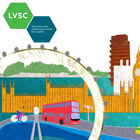The Way Ahead for London

Don’t run. I am going to write a frightening word, but we can face it together: Co-production.
There. I did it. As an impact evaluator, I often have to help clients find ways to really co-produce data and evaluations, and it is not, often, something that happens without some failures. This can be frightening, because time is always of the essence and because funders want co-production (even when they don’t do it very well). It is proven to be transformative, though. It is worth doing and doing well, and it is worth learning from failure at it.
I am endeavouring to practice the things I preach as I work on The Way Ahead. The project seeks to build an infrastructure to help Civil Society organisations, which is as co-produced as possible. I am only working on the data sharing aspects, but studies have shown that open databases for civil society, which are co-produced, are more used and (assumably) more useful.
We have a lot of work to do. London is a large and very diverse community. We are going to have to pull our sleeves up and hit the streets, call all partners, think outside the box, and continually look at our stats to see if we are making any headway. We will also be able to gather information about various communities from digital resources, and we can use scholarship about populations, as well. The work requires real care, because simply having someone who identifies with a certain group, does not equal having a representative of the group. We can gather insights from individuals, and then investigate those insights, true, but that is not co-production.
Co-production is a process and a product by which we provide an ongoing method for various stakeholders to be involved in, and provide insight to, research. The work of co-production often begins by identifying many different stakeholder groups and then finding out how to introduce your project, exhibit listening, and repeat. With each iteration, we gain some insight. Sometimes the new insight is from failure. Such is the nature of learning.
For example, I am part of a large minority in London, an immigrant from America. There are more than 60,000 of us living in London. Never assume that any opinion I have is anything like any other American, or even like other Americans in London. You will probably be very wrong. No one person can actually speak for large and diverse populations. BUT, if I tell you that I don’t want to come to your meeting about the data sharing project because I think it is only for people who were born in Britain and have a British accent, then: you have some insight worth investigating. Are non-UK born people not attending the events because of this perception? Something else? Or is it many things? By letting other non-UK-born persons know that you have heard the voice of one, you might encourage others to speak up, and then, you may find barriers that inhibit many from a group with a particular situation. (Maybe I am the only one who is intimidated by British accents.)
It is wonderful and fascinating work, co-producing, and I’ll keep you updated about our strategies and success or failure, here.
This week, I sent out various notices about the meeting in other languages, and I began looking for non-English language radio. I got a warm reception, which is a good start. We shall see how it goes. We’ll also be reaching out to different age groups (and diverse different age groups!), of course, and monitoring involvement by diverse people of various levels of education. It takes a whole range of people to get this right. If you want to help, please be in touch.
More The Way Ahead articles